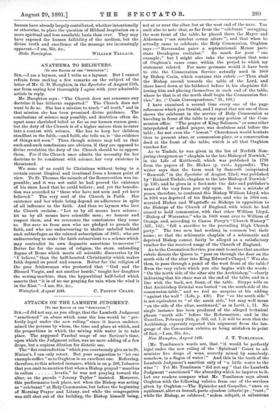ANATHEMA TO BELIEVERS.
[To THE EDITOR OP THE "SPECTATOR."] SIR, —I am a layman, and I write as a layman. But I cannot refrain from making a few remarks on the subject of the letter of Mr. G. D. Haughton, in the Spectator of August 15th, nor from saying how thoroughly I agree with your admirable article in reply.
Mr. Haughton says : " The Church does not renounce any doctrine it has hitherto supported." The Church does not want to do so. She has a mission to teach " all truth," and in that mission she has been promised divine guidance. The conclusions of science may possibly, and doubtless often do, upset some cherished belief as far as our human reason goes ; but the duty of the Church is of a higher nature than to enter into a contest with science. She has to keep her children steadfast in the faith,—and faith, she tells us, is '• the evidence of things not seen." Thus, though science may tell us that such-and-such conclusions are obvious, if they are opposed to divine revelation the duty of the Church should be to oppose them. For if the Church once admits the necessity for her doctrine to be consistent with science, her very existence is threatened.
We none of us could be Christians without being to a
certain extent illogical and irrational from a human point of view. To St. Thomas, the miracle of the Resurrection was im- possible, and it was not until he had proved the existence of his risen Lord that he could believe ; and yet the benedic- tion was accorded to " those who have not seen and yet have believed." The very soul of the Church is Faith. Her existence and her whole being depend on adherence in spite of all influence to the faith. And thus we laymen who love the Church exclaim : " Let us by all means have science ; let us by all means have scientific men; we honour and respect them, and we reverence the conclusions they come to. Bat save us from men who are pledged to preach the faith, and who are endeavouring to shelter unbelief behind such subterfuges as the relaxed subscription of 1865; who are endeavouring to make the faith subservient to a science which may contradict its own dogmatic assertions to-morrow !" Better far for the cause of religion, the stern, unbending dogma of Rome which meets all scientific discoveries by its "I believe," than the half-hearted Christianity which makes faith depend on proof and reason. Better far the religion of the poor Irishwoman who protested that " God and the Blessed Virgin, and not another beside," taught her daughter the sewing-machine, than the hypocritical half-belief which asserts that "it is of no use praying for rain when the wind is in the East."—I am, Sir, &c.,


































 Previous page
Previous page